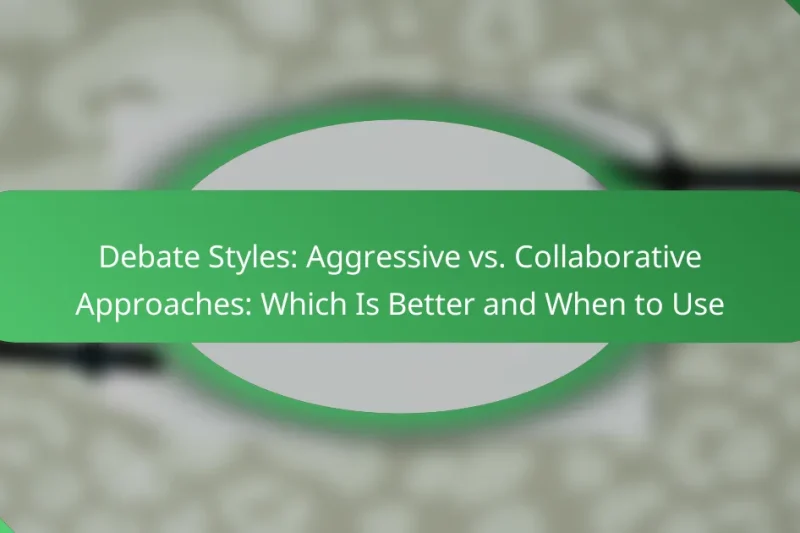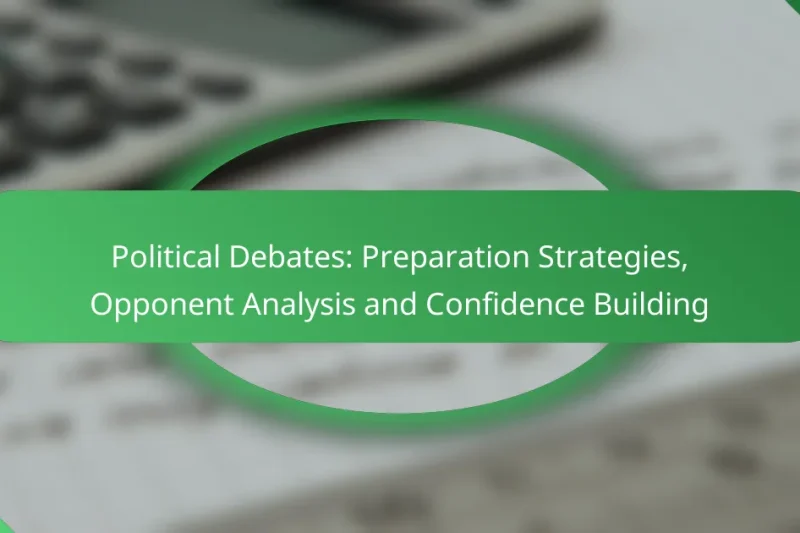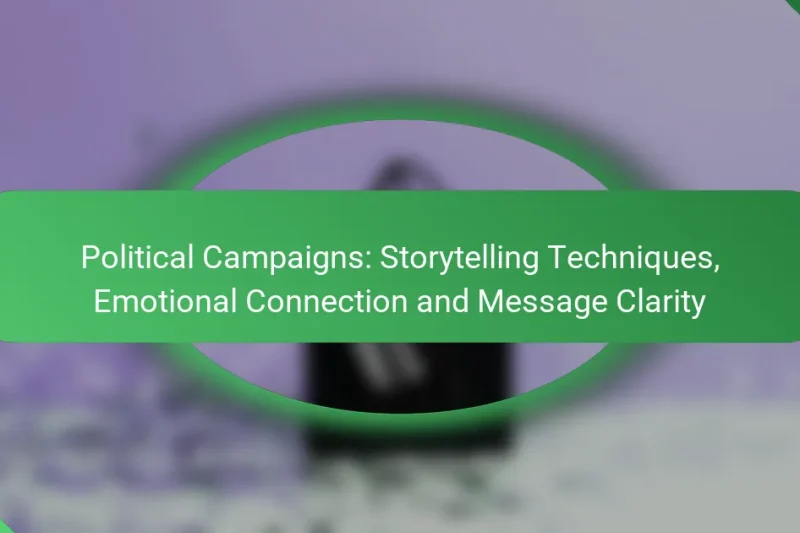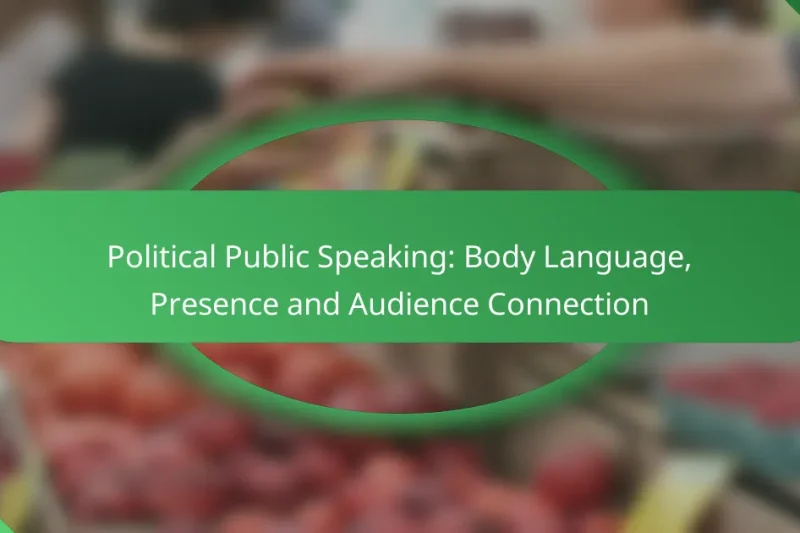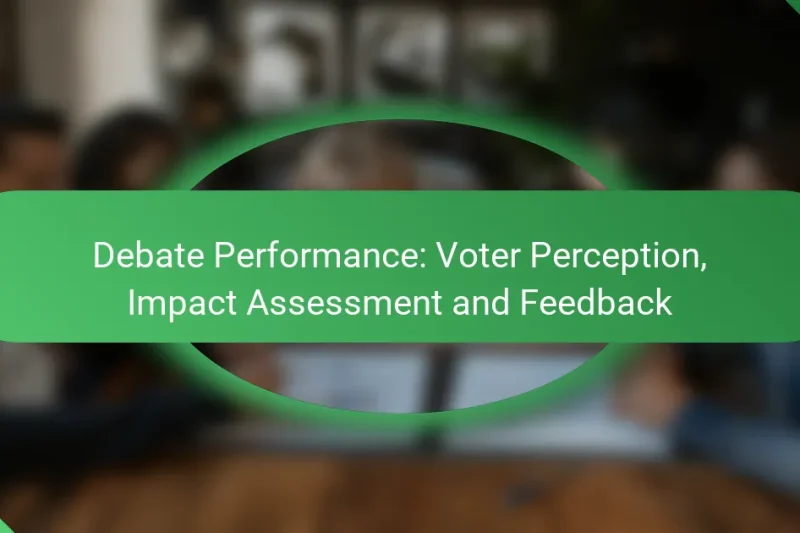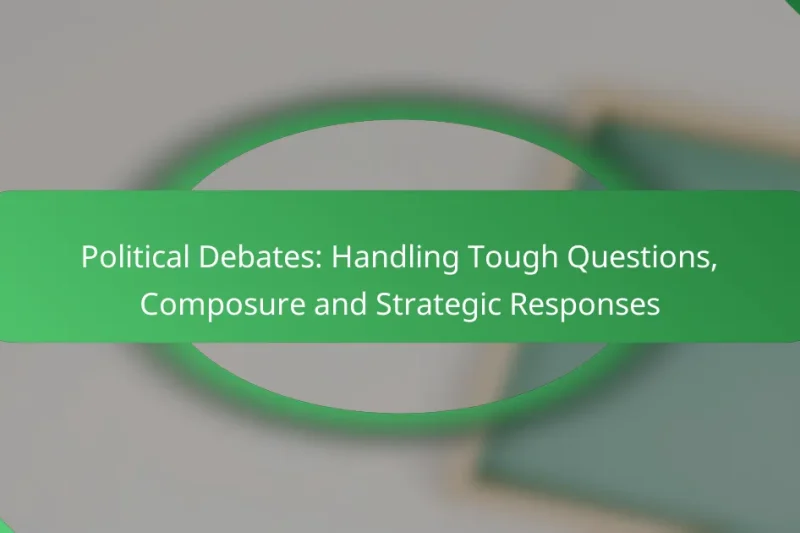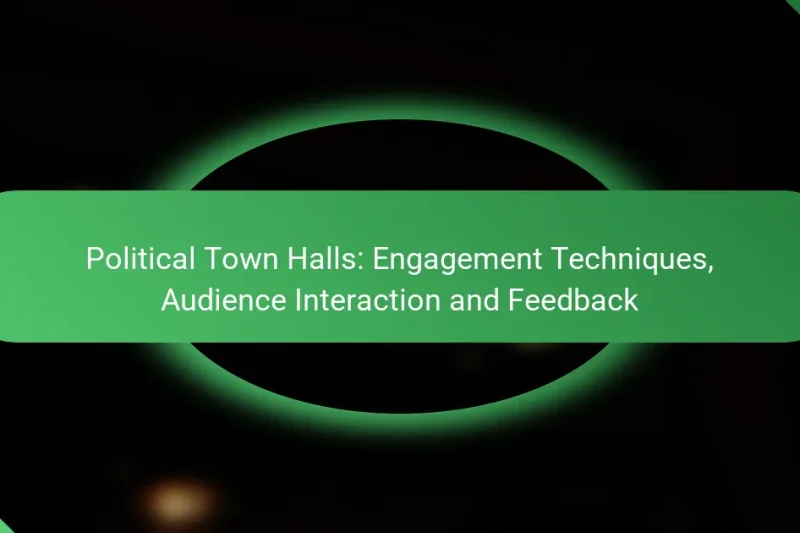Debate styles play a crucial role in shaping discussions, with aggressive and collaborative approaches each offering … Debate Styles: Aggressive vs. Collaborative Approaches: Which Is Better and When to UseRead more
Debate and Public Speaking Skills for Candidates
Debate and public speaking skills are essential for candidates looking to effectively communicate their ideas and engage with voters. Mastering these skills involves thorough preparation, understanding key issues, and utilizing persuasive techniques to make a compelling case. Additionally, consistent practice and constructive feedback can significantly enhance a candidate’s confidence and effectiveness in delivering impactful speeches.
Political Debates: Preparation Strategies, Opponent Analysis and Confidence Building
Preparing for political debates requires a multifaceted approach that includes comprehensive research, strategic planning, and confidence-building … Political Debates: Preparation Strategies, Opponent Analysis and Confidence BuildingRead more
Political Campaigns: Storytelling Techniques, Emotional Connection and Message Clarity
In the realm of political campaigns, storytelling serves as a powerful tool to forge emotional connections … Political Campaigns: Storytelling Techniques, Emotional Connection and Message ClarityRead more
Political Public Speaking: Body Language, Presence and Audience Connection
In political public speaking, body language plays a vital role in conveying confidence and sincerity, helping … Political Public Speaking: Body Language, Presence and Audience ConnectionRead more
Debate Performance: Voter Perception, Impact Assessment and Feedback
Debate performance plays a crucial role in shaping voter perception by influencing how candidates are seen … Debate Performance: Voter Perception, Impact Assessment and FeedbackRead more
Political Debates: Handling Tough Questions, Composure and Strategic Responses
In political debates, handling tough questions is crucial for candidates seeking to convey their competence and … Political Debates: Handling Tough Questions, Composure and Strategic ResponsesRead more
Political Town Halls: Engagement Techniques, Audience Interaction and Feedback
Political town halls serve as vital platforms for enhancing civic engagement by enabling direct communication between … Political Town Halls: Engagement Techniques, Audience Interaction and FeedbackRead more
What are effective debate strategies for candidates?
Effective debate strategies for candidates involve thorough preparation, strong communication skills, and the ability to engage with the audience. Candidates should focus on understanding key issues, practicing responses, and utilizing persuasive techniques to make a compelling case.
Research and understand key issues
Candidates must have a deep understanding of the issues they will debate. This includes knowing the facts, statistics, and different perspectives surrounding each topic. Researching current events, public opinion, and historical context can provide a solid foundation for arguments.
Utilizing reliable sources such as academic journals, reputable news outlets, and expert opinions can enhance credibility. Candidates should be prepared to discuss these issues in detail and answer questions that may arise during the debate.
Practice rebuttals and counterarguments
Anticipating opponents’ arguments is crucial for effective debate performance. Candidates should practice formulating rebuttals and counterarguments that directly address the points made by their opponents. This preparation allows candidates to respond confidently and effectively during the debate.
Engaging in mock debates with peers can help candidates refine their responses and improve their ability to think on their feet. Focusing on the most likely counterarguments can streamline preparation and enhance overall debate performance.
Utilize persuasive techniques
Persuasion is key in debates, and candidates should employ various techniques to connect with their audience. Utilizing emotional appeals, logical reasoning, and credible evidence can strengthen arguments. For instance, storytelling can make complex issues more relatable and memorable.
Additionally, candidates should be mindful of their body language and tone of voice, as these non-verbal cues can significantly impact how messages are received. Practicing these techniques can lead to a more compelling delivery.
Engage with audience questions
Engaging with audience questions demonstrates a candidate’s confidence and knowledge. Candidates should encourage questions and view them as opportunities to clarify their positions and address concerns. This interaction can enhance rapport with the audience and showcase transparency.
Practicing responses to common questions can help candidates feel more prepared. They should aim to listen actively and respond thoughtfully, ensuring that they address the question while reinforcing their key messages.
Analyze opponents’ weaknesses
Identifying and analyzing opponents’ weaknesses can provide candidates with strategic advantages during a debate. This involves understanding their opponents’ positions, past statements, and any inconsistencies in their arguments. Candidates should prepare to highlight these weaknesses tactfully.
However, it is essential to maintain a respectful tone and focus on the issues rather than personal attacks. This approach not only strengthens a candidate’s position but also reflects positively on their character and professionalism.
How can candidates improve public speaking skills?
Candidates can enhance their public speaking skills through consistent practice, constructive feedback, and participation in supportive environments. Engaging in structured activities and seeking guidance from experienced speakers can significantly boost confidence and effectiveness in delivering speeches.
Join local Toastmasters clubs
Joining a local Toastmasters club provides candidates with a structured environment to practice public speaking regularly. These clubs focus on improving communication and leadership skills through prepared speeches and impromptu speaking opportunities.
Members benefit from a supportive community that encourages growth and offers constructive critiques. Participation can lead to significant improvements in clarity, confidence, and overall presentation skills.
Engage in mock speeches
Practicing mock speeches allows candidates to simulate real speaking situations in a low-pressure setting. This can involve rehearsing in front of friends, family, or colleagues who can provide valuable insights.
Setting specific goals for each mock session, such as improving body language or vocal variety, can help candidates focus on particular areas for improvement. Regular practice can lead to increased comfort and familiarity with the material.
Record and review practice sessions
Recording practice sessions enables candidates to analyze their performance critically. Watching these recordings can reveal areas for improvement, such as pacing, tone, and audience engagement.
Reviewing recordings also helps candidates track their progress over time. Identifying strengths and weaknesses through self-assessment can lead to more targeted practice and refinement of skills.
Seek feedback from mentors
Feedback from experienced mentors can provide candidates with insights that they may overlook themselves. Mentors can offer guidance on content, delivery, and audience connection, which are crucial for effective public speaking.
Establishing a regular feedback loop with a mentor can accelerate skill development. Candidates should be open to constructive criticism and willing to implement suggested changes to enhance their speaking abilities.
What role does body language play in debates?
Body language plays a crucial role in debates by influencing how messages are perceived and understood. Effective use of non-verbal cues can enhance communication, convey emotions, and establish a connection with the audience.
Enhances message delivery
Body language can significantly enhance message delivery by reinforcing spoken words. Gestures, posture, and facial expressions can emphasize key points, making them more memorable. For instance, using hand movements to illustrate a concept can help clarify complex ideas.
To maximize impact, candidates should practice synchronizing their verbal and non-verbal communication. This alignment ensures that body language supports the message rather than distracts from it.
Conveys confidence and authority
Confident body language conveys authority and can instill trust in the audience. Standing tall, maintaining eye contact, and using open gestures signal self-assurance. Candidates who exhibit these traits are often perceived as more credible and capable.
Avoiding closed-off postures, such as crossed arms, can prevent the impression of defensiveness. Instead, adopting an open stance invites engagement and demonstrates readiness to address questions and concerns.
Improves audience engagement
Engaging body language can capture and maintain audience attention throughout a debate. Movements that reflect enthusiasm, such as leaning slightly forward or using expressive gestures, can create a dynamic atmosphere. This engagement encourages the audience to connect with the speaker’s message.
To enhance audience interaction, candidates should be aware of their surroundings and adjust their body language accordingly. For example, making eye contact with different sections of the audience can foster a sense of inclusion and participation.
How can candidates prepare for public speaking events?
Candidates can prepare for public speaking events by understanding their audience, organizing their key messages, and practicing in the actual venue. These steps help ensure clarity, engagement, and confidence during the presentation.
Know the audience demographics
Understanding the audience demographics is crucial for tailoring your message effectively. Consider factors such as age, education level, cultural background, and interests. This knowledge allows candidates to connect with the audience on a personal level and address their specific concerns.
For example, if speaking to a younger audience, using contemporary references or technology can enhance relatability. Conversely, a more mature audience may appreciate traditional values and historical context.
Outline key message points
Creating a clear outline of key message points helps maintain focus during the speech. Identify the main ideas you want to convey and arrange them logically. Aim for three to five core points to avoid overwhelming the audience.
Using simple language and relatable examples can make your message more accessible. Consider employing a structure like problem-solution-benefit to clearly articulate your stance and engage listeners effectively.
Rehearse in the actual venue
Rehearsing in the actual venue is essential for familiarizing yourself with the space and its acoustics. This practice helps you gauge the audience’s sightlines and adjust your delivery accordingly. If possible, visit the venue beforehand to get comfortable with the layout.
During rehearsal, pay attention to timing and pacing. Aim for a practice run that closely mimics the actual event, including using any available equipment. This preparation can significantly reduce anxiety and improve overall performance on the day of the event.
What are common public speaking mistakes to avoid?
Common public speaking mistakes can significantly undermine a candidate’s effectiveness. Avoiding these pitfalls can enhance clarity, engagement, and overall impact during presentations.
Overloading slides with text
One major mistake is cramming too much text onto presentation slides. This can overwhelm the audience and distract from the speaker’s message. Aim for concise bullet points or visuals that complement your spoken words.
As a rule of thumb, limit each slide to a few key points—ideally no more than six lines of text. This keeps the audience focused and allows for easier retention of information.
Ignoring time limits
Failing to adhere to time limits can frustrate both the audience and event organizers. It is crucial to practice your speech to ensure it fits within the allotted time, allowing for a smooth delivery without rushing or cutting important content.
Consider using a timer during practice sessions. Aiming for a speech that is slightly shorter than the maximum time can provide flexibility for questions or unexpected delays.
Neglecting audience interaction
Neglecting to engage with the audience can lead to a disconnect, making your presentation less impactful. Incorporating questions, polls, or brief discussions can foster a more dynamic environment and keep the audience invested.
Try to include at least one interactive element in your presentation. This could be as simple as asking for a show of hands or inviting questions at key points, which helps maintain attention and encourages participation.
How can candidates leverage technology in debates?
Candidates can effectively leverage technology in debates by utilizing tools for research, presentation, and audience engagement. This includes using digital platforms for real-time feedback and data visualization to enhance their arguments.
Using social media for real-time engagement
Social media platforms allow candidates to engage with audiences during debates, providing instant feedback and interaction. Candidates can use Twitter or Facebook to share their thoughts, respond to questions, and gauge public sentiment as the debate unfolds.
To maximize impact, candidates should monitor trending topics and hashtags related to the debate. This helps them tailor their responses and connect with viewers on issues that matter most to them.
Incorporating multimedia presentations
Multimedia presentations can enhance a candidate’s message by making complex information more accessible. Using slides, videos, or infographics can help clarify points and keep the audience engaged.
When creating multimedia content, candidates should ensure it is clear and relevant. A well-structured presentation with visual aids can significantly improve retention of key messages.
Utilizing data analytics for strategy
Data analytics can inform candidates about voter preferences and debate performance. By analyzing viewer engagement metrics and sentiment analysis, candidates can adjust their strategies in real-time.
Investing in analytics tools can provide insights into which arguments resonate most with the audience, allowing candidates to focus on their strengths and address weaknesses effectively.
